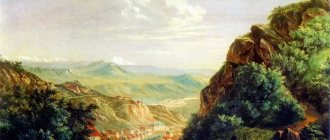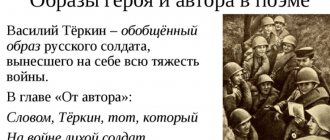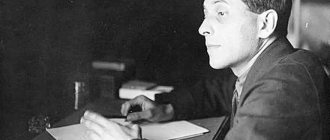The Caucasus occupies a special place in the works of Mikhail Yuryevich Lermontov. At the age of 10, the future poet and his grandmother visited this extraordinary land for the first time, relaxing “on the waters.” It was in the Caucasus that young Lermontov met a girl for whom he experienced his first serious feelings. The poet carried the memories of this hobby throughout his life.
The next time Lermontov arrived in the Caucasus was for military service.
Impressions from local folklore, the life of highlanders, and the nature of the Caucasus formed the basis for many of the poet’s works.
History of creation
The idea of writing a romantic confessional work based on ancient legends matured in Lermontov in his early youth.
The poet wrote about this in his diary: “Write notes of a young monk of 17 years old. Since childhood, he read nothing in the monastery except sacred books.”
The creative idea came to life many years later - in 1830, in the poem “Confession”. The main character of the work is a monk sentenced to death because of love.
In the poem "Boyar Orsha", written in 1835-1836, the central character is also a pupil of the monastery.
But Lermontov did not stop at these early creative developments.
In 1838, the poet began writing the poem “Mtsyri”.
According to historians and literary scholars, the work was based on the motives of two stories at the same time.
The first, the legend about the young man and the leopard, was heard by Lermontov during his visit to the Caucasus, while still very young.
The second story is the story of an elderly monk whom the poet met in 1837 on the Georgian Military Road. It was from the lips of a monastery servant that Mikhail Yuryevich heard a story about the difficult fate of a Caucasian boy left by a Russian general in a monastery in Mtskheta.
The events described by the old monk and which greatly impressed Lermontov could really have happened during the period of military operations of the Russian Imperial Army, which pursued the goal of annexing the mountainous regions of the North Caucasus into the Russian Empire.
Talentedly rethought by Lermontov, the stories were combined into one outstanding romantic work - the poem “Mtsyri”, published in 1940 in the only lifetime edition of the author of “Poems by M. Lermontov”.
What is the work about?
The action of the poem takes place near Mtskheta, the ancient capital and spiritual center of Georgia. The ancient monastery of Jvari rises above the city.
A Russian general traveling to Tiflis decides to leave a captive six-year-old boy, sick and weak, with the monks, for fear of not being able to bring him to Tiflis alive.
The Chernetsy accept the child, surround him with care and raise him in a truly Christian spirit. Mtsyri—that’s the boy’s name now—does not remember his family, at first he shuns the monks, but gradually gets used to the reclusive life in the monastery.
Years later, one day on the eve of becoming a monk, a sixteen-year-old young man disappears from the monastery.
After three days of searching, the fugitive, found near Mtskheta, weakened and unconscious, is brought to the monastery. Having come to his senses, the young man does not want to answer the monks’ questions and refuses to eat. And only to the old monk who once left him, Mtsyri reveals the true reason for his escape.
The young man talks about how he was striving for freedom, to his native village, to his father’s house.
In freedom, in unity with pristine nature, he felt happy, and the spirit of will resurrected in him the images of his father and sisters.
Mtsyri told the old man about how he lived for three days outside the walls of the ancient monastery, which he considers the place of his imprisonment:
You want to know what I did
Free? Lived - and my life
Without these three blissful days
It would be sadder and gloomier
Your powerless old age.
Mtsyri told about his victory in a bloody single combat with a formidable leopard.
In search of a way to his native land, the young man ran, climbed, crawled... But after three days of wandering in the mountains, he realized that, having made a circle, exhausted, he again got out onto the road leading to the monastery that had sheltered him.
Despair overcame Mtsyri, who in his confinement in the monastery had lost the instinct of life and natural instinct that could lead him to his home.
Dying, the young man asks the old monk to bury him in the monastery garden, from where the Caucasus is visible and where the native speech and song of the mountaineers can reach from his native village.
Option 2
Great Russian poet. M.Yu. Lermontov conceived the idea of creating a poem about the wanderings of a young highlander, deprived of his homeland and family, in his youth. As a child, he often visited the Caucasus with his grandmother, who brought him for recovery. Little Lermontov was in poor health. The poet wholeheartedly fell in love with the mountains and nature of the Caucasus. Once, at the age of 23, he once again visited the Caucasus, in particular the city of Mtskheta, the old capital of Georgia. There he met a monk who told Mikhail an amazing and sad story. The poet had long dreamed of writing something like this. The poem "Mtsyri" was published in 1840, a year after its creation. At first he gave it the name “Beri”, which means “monk” in Georgian. But then he replaced it with the word “Mtsyri”, which was more suitable for his creation, translated from Georgian as “novice”, foreigner.”
The poem does not describe events in chronological order. First, an ancient monastery is described, long abandoned, where the main character was brought up. Then the author returns to the boy’s childhood and his memories of his distant homeland, to how he ended up in a foreign land:
The Russian general was taking a six-year-old child captured to Tiflis. But on the way, the boy became very ill, and the general abandoned him in a monastery under the supervision of monks. Despite his age, the boy was patient and proud: he did not complain a word about his torment. One of the monks was dying, and he was left as a novice at the monastery. He learned a foreign language, a foreign religion, but apparently he could not forget his father’s house. He was always sad and silent. The boy imperceptibly turned into a young man, and the time had come for him to take the monastic vow. But suddenly, on a dark autumn night, he disappeared. The monks searched for him for three days, but in vain. Emaciated and exhausted, some people found him in the steppe and brought him to the monastery. When the young man came to his senses, he refused food and did not want to speak.
Then a monk came to him, who once cured him. Gathering his last strength, Mtsyri told the monk about his thoughts and feelings, about what he was doing outside the monastery. First of all, Mtsyri reproached his mentor for saving his life in childhood. He recalled with bitterness that he was torn away from his native land, from his father and mother, and made a slave! But he always dreamed of being at least for a moment where he was born.
And then he ran away! To freedom, away from the dark walls, to freedom! He remembered everything: his father and mother, his sisters, his house in the gorge. Having met a girl with a jug by the stream, he was embarrassed by her beauty. And so he wanted to live a real life, as his ancestors lived: to love, to fight, to enjoy the beauty of nature.
And then he met a leopard, an amazingly beautiful but dangerous predator. The hunter's instinct awoke in the young man and he decided to fight the beast. A mortal battle has begun:
“And we, intertwined like a pair of snakes, Embracing tighter than two friends, Fell at once, and in the darkness the Battle continued on the ground.”
Man won this battle. Mtsyri realized what kind of hero he could be in his country. He went further to look for his native mountains, but it turned out that he had made a circle and returned to the vicinity of the monastery. He was overcome with despair. Then I decided to die. After all, death is better than eternal captivity. He deliberately refuses food and asks only that he be interred in that part of the monastery garden from where one can see the Caucasus.
At first, critics perceived the poem as a call for revolution. But later they considered this topic more broadly: love for the Motherland, for one’s historical roots, and the desire for love and family are glorified. Slavery and the imposition of a certain spirituality are condemned. A person strives to be free and happy. “Trust in life and in the inner strengths of the individual is proclaimed and poeticized by Lermontov in Mtsyri” (V.I. Korovin).
Genre and direction
“Mtsyri” is an example of a classic Russian romantic poem with all the characteristics inherent in this genre.
In the work, the real world retreats before the world of dreams, in the name of which the main character overcomes incredible difficulties and obstacles.
Protest, rejection of the existing situation, struggle for freedom and return to one’s homeland are the main ideas of the romantic rebel hero, to whose inner world the author’s attention is closely drawn.
The confessional nature of the narrative is also a romantic feature of the work.
A very important place in the poem is given to nature, which does not just serve as a picturesque background, but is an effective force and allows Mtsyri to show his love of freedom and determination.
One of the main signs of the romantic nature of the poem is the poet’s appeal to folklore motifs.
The main character and his characteristics
In the draft, the poem by M.Yu. Lermontov was called "Bary". The poet added a clarification to this name: “Beri, in Georgian: monk.” But the main character of the work is not yet a monk, he is just preparing to become one, and in 1840 the work is published under the title “Mtsyri”, which means “novice” in Georgian.
At the beginning of the story, the main character appears before the reader as a six-year-old boy, weakened by illness, but with a strong character:
Like a chamois of the mountains, timid and wild
And weak and flexible, like a reed.
But there is a painful illness in him
Then developed a mighty spirit
His fathers.
Left by the Russian general in a monastery, the boy withdraws into himself. Mtsyri feels like a prisoner, forced to be obedient and humble.
The image of the young man is revealed after the escape, in confession to the old monk.
Once free and feeling free, Mtsyri is transformed. The young man is delighted with everything he meets on his way. He admires the extraordinary power of the mountains, the beauty of the valleys, beautiful gardens, the transparency of icy streams, comparing three days in freedom with life in a monastery:
I lived little and lived in captivity.
Such two lives in one,
But only full of anxiety,
I would trade it if I could.
Mtsyri is fearless in his desire to fulfill his dream. He wants to return to his native land, to his father’s house, and he is not afraid of adversity and obstacles.
The young man does not become embittered after he realizes that he cannot make his dream come true. When he dies, he does not intend to curse anyone.
Considering himself defeated, Mtsyri does not repent of his perfect escape and believes that he will definitely become free, return to the land of his childhood and hear his native speech.
Mtsyri - romantic hero - essay
One of the themes of essays based on the work “Mtsyri” by the great Russian poet Mikhail Lermontov is to prove that Mtsyri is a romantic hero. Below are 3 essay options.
Option 1
Mtsyri is the main character of the poem of the same name. He is the son of highlanders. As a child, Mtsyri was captured by a Russian general. The boy was very weakened by the road, and the general left him in a monastery that lay on his way. There the monks left the child, he gradually began to forget his past, his language. He was being prepared for tonsure.
For the protagonist, the monastery became identified with a prison. At night Mtsyri has vague dreams from his past life, he understands that he is not free in his choice. He longs to break free, to experience life outside the walls of the monastery.
And then one day Mtsyri decides to escape, which ends tragically for the hero. Just a day spent in freedom becomes the price of your life. Before his death, Mtsyri confesses and says that this day was the best day of his life. To live for a hero means to rejoice at every blade of grass, sunbeam and breath of wind. It is once outside his “prison” that Mtsyri begins to remember his past: life in the village, his native language, the memory of his ancestors. The mountain man's blood boils in him with even greater force when he accidentally meets a Georgian girl by the stream. Mtsyri is a patriot, he wants to return to his homeland. But a meeting with a leopard does not allow his dreams to come true.
Like every romantic hero, Mtsyri is lonely. He understands that life in a monastery is just the existence of a body without a soul; the soul will always strive to be free. But even in the village where he so longs to get, Mtsyri would be a stranger. It is possible that the only solution to this conflict in the work is the death of the hero. His search for happiness, his fight for freedom and faith in life is what is truly admirable about him. Finding himself free, having won a battle with a dangerous enemy, he dies in a monastery behind bars. But he asks to be buried outside the walls of the monastery, where just a day of happiness became more valuable to him than all the years spent in captivity.
In the image of Mtsyri, Lermontov put the best features of the romantic heroes of his time. He contrasted passivity and apathy with the inner freedom of man.
"Mtsyri" - reader's diary
“Mtsyri” - plan for the poem
Option 2
M. Yu. Lermontov is a wonderful writer and poet who created many vivid romantic images. This is the bored traveler Pechorin, the jealous avenger Arbenin, and the freedom-loving rebel Mtsyri. These heroes, so different from each other, are close in one thing - they are in constant search, they love freedom, they fight for their ideas.
Mtsyri is the main character of the poem of the same name. Like all romantic heroes, he is a little dreamy and enthusiastic. But at the same time, Mtsyri is the son of highlanders. As a child, he was captured by a Russian general after a battle. During the difficult journey, the boy fell ill and was left in the care of the monks. They came out to Mtsyri and raised him as a Christian. The child forgot his language and his culture, they began to forcibly prepare him for tonsure.
For the young man, the monastery began to be identified with a prison. He understands that his past and present have been taken away from him, that decisions are made for him, that he is not free in his choice. At night, the young man dreams of foggy pictures from his past life. He wants to break free, he longs to see the life hidden by the walls of the monastery. And Mtsyri decides to escape.
The monks searched for the fugitive for several days, and finally found him half-dead in a clearing. The young man is taken to his cell, where he confesses before his death. Mtsyri tells how wonderful it was for him to breathe in freedom. Seeing his native expanses, he finally remembered his family and his language, his father and brothers with weapons in their hands. The young man feels nature very subtly and admires its beauty. For him, living means enjoying every blade of grass, every glare of the sun. Here, in freedom, a young man for the first time experiences romantic feelings for a Georgian girl whom he accidentally meets by a water stream. His heart draws him to her, but he restrains his impulses and sets out in search of his home.
Although Mtsyri is a romantic hero, first of all he is a freedom-loving patriot. Love for his native village and for a beautiful girl are inseparable for him, the thirst for freedom and personal happiness merges into the only desire of his heart. The young man is strong and brave, he fearlessly enters into battle with a wild animal and wins, despite exhaustion and bloody wounds. The hero is absorbed in one thought - to find freedom, to find his home. But these aspirations are not destined to come true.
The young man again sees the walls of the hated monastery! Mtsyri understands that he will end up in prison again. Like all romantic heroes, the young man is alone in his grief, he is an extra person. His hopes of finding happiness in his native village are impossible even because no one is waiting for him there. Mtsyri’s relatives died, and for his fellow villagers he will seem alien, not like everyone else. Before his death, the young man asks to be buried outside the walls of the monastery, in freedom, and regrets that he only managed to feel happy for one moment. This is the whole tragedy of the romantic image of Mtsyri. His unbridled desire for love and freedom is shattered by the realities of a cruel world. Having taken a breath of the clean air of independence, he again becomes a slave and dies behind bars.
Option 3
In his works, Lermontov took into account the creative experience of Byron, who was his idol for many years, which is why we can talk about Lermontov’s heroes as Byronic heroes. The Byronic hero is a romantic hero of the highest quality, a rebel hero with a fiery nature. No circumstances can break him. These qualities especially attracted Lermontov, and it is them that he writes out in his heroes with special care. Such is the romantic hero Mtsyri, who can be called the ideal of a romantic hero.
We learn about Mtsyri’s life, or rather about its key moments, first-hand, since Lermontov chose the form of confession for the poem. This is one of the most popular genres of romanticism, since confession allows you to open the depths of the human soul, making the story both emotional and sincere. The hero is placed in an unusual place: in a monastery in the Caucasus, and the Caucasus for Russian people then seemed like a very exotic land, a center of freedom and free-thinking. The features of the romantic hero of “Mtsyri” can already be seen in how little the reader is told about the hero’s previous life - just a few meager phrases about his childhood. His life in the monastery is shrouded in mystery, so characteristic of romantic works. Little Mtsyri was captured by a Russian general and brought to the monastery, where he grew up - that’s what the reader knows. But Mtsyri himself is not an ordinary monk, he has a completely different character, he is a rebel by nature. He was never able to forget his homeland and abandon it; he longs for real life and is ready to pay any price for it.
Was it easy for Mtsyri to decide to escape from the quiet existence in his cell? It is obvious that the monks who cured and raised Mtsyri did not wish him harm. But their world cannot become Mtsyri, since it was created for another life. And in her name he is ready to take risks. In accordance with the romantic tradition, life in the monastery and life outside it are contrasted here, with the first symbolizing the lack of freedom and constraint of the human personality, while the second is an ideal life. It is precisely this that Mtsyri, born for freedom, strives for. His escape is a rebellion against tradition; it is significant that it takes place on a stormy, stormy night, when monks are supposed to pray, fearing the “wrath of God.” For Mtsyri, the thunderstorm evokes delight, a desire to become related to the rebellious elements: “I’m like a brother...”. The hero's sincerity overcomes his ostentatious monastic humility - Mtsyri finds himself free.
Tragedy of Mtsyri
The romantic hero is almost always doomed to defeat in the fight against the world, since this fight is unequal. His dreams, as a rule, do not come true, and his life ends early. In this, the romantic hero of Lermontov’s poem “Mtsyri” turns out to be an exception: he still managed to fulfill part of his dream and breathe in the air of freedom. Another thing is that, as the epigraph to the poem tells us, he “tasted little honey,” and freedom was given to him for only three days - but the more vividly they will experience this time. Mtsyri is happy with his merging with nature. Here, memories of his family, his native village and a happy childhood come back to him. Here his blood awakens, the blood of the warlike highlanders, and he turns out to be capable of feats. During the battle with the leopard, Mtsyri appears before the reader as a brave warrior, fully aware of his strength and able to use it. He is beautiful, just like the wild nature around him: he is part of it and its child.
But Lermontov could not rightfully be called a great romantic poet if he had turned his poem into a happy fairy tale. Mtsyri is defeated by circumstances, he is wounded and again brought to his cell. Freedom only beckoned him, but his main dream: to return to his homeland, to the distant, free Caucasus, did not come true. And, if you think about it, it was not feasible at all, because no one was waiting for him there. Mtsyri’s loved ones were long dead, the house was destroyed, and in his own home he would have turned out to be exactly the same stranger as in the monastery. This is where true romantic tragedy manifests itself: the hero is completely excluded from this world and is equally alien to everyone in it. Happiness may await him only beyond the limits of life, but Mtsyri does not want to give up. He would willingly exchange “Paradise and Eternity” for a few minutes at home. He dies unbroken and his last gaze is turned to the Caucasus.
The image of Mtsyri is the image of a romantic hero with a deeply tragic story, who rightfully enjoys the love of many generations of readers. “...You see what a fiery soul, what a mighty spirit, what a gigantic nature this Mtsyri has!” - this is how the critic Belinsky spoke about him, and the critic’s words really fully characterize the hero. Years go by, literary trends change, the romantic tradition is a thing of the past, but the image of Mtsyri still inspires heroic deeds and awakens love for what is most valuable: life and homeland.
Themes and idea
The thematic lines of the work are interconnected and form a single artistic whole.
The desire for freedom is one of the two key themes of the work. The poem is not so much about physical freedom, but about freedom of spirit and the opportunity to enjoy the fullness of life:
A long time ago I thought
Look at the distant fields
Find out if the earth is beautiful
Find out for freedom or prison
We are born into this world.
Love for the homeland, attachment to one’s home and loved ones is the second key theme of the work. A little boy, deprived of parental love and care since childhood, unable to see his father and sisters, dreams of returning to his parents’ home throughout his short life. He claims that this dream forced him to flee, to leave the monastery, where he was treated with kindness and attention:
And I remembered my father's house,
The gorge is ours and all around
A scattered village in the shade;
I heard the evening noise
Home of the running herds...
Loneliness among people is another theme of the work. Mtsyri is a freedom-loving rebel. Neither the good attitude of the Chernetsy towards him, nor the strict orders of the monastic fortress can keep him from escaping to freedom. What the monks surrounding and raising the young man have been accustomed to since ancient times is unacceptable for him, just as Mtsyri’s desire for freedom and an irresistible craving for his native land are unacceptable for the monks.
War. The author mentions her indirectly in the work. But it was precisely in connection with military operations that Mtsyri ended up with a Russian general at the age of six, was brought up in a monastery, and fled...
The theme of love for a woman is not very developed in the work. The reader is reminded of her only by the scene where Mtsyri looks with delight and surprise at a young Georgian woman collecting water from a stream.
The idea of the work is based on the idea that the desire for freedom, the desire to live in one’s native land, to love one’s loved ones cannot be taken away from a person, even one who is on the verge of death.
Essay No. 3
In the work about Mtsyri, the author at the very beginning describes the main character and how he spent his childhood. He fell ill with a terrible disease in captivity when he was transported to Russia. One of the monks he met along the way took pity on Mtsyri and sheltered him, at the same time curing his illness. After this, the monk took a procession over the main character. He gave him the most important thing that was useful to him during his adult life.
A severe illness and the mockery of fate instilled in the main character masculinity and a strong spirit. He spent his entire childhood without communicating with his peers. But Mtsyri overcame all the difficulties that fate brought him.
After a long period of time, when the hero grows up, the monks prepare him for haircut. When the author described this passage, he also indicated that Mtsyri was accustomed to captivity, so this did not outrage him. At that time, he really didn’t look very good, but he learned strange traditions and knew an alien language. If you look into all this, you can find out that he agreed to changes in his life because he did not know another life. As a result, he had no choice but to agree to the vow of humility. But one day the hero showed himself. One day there was a night thunderstorm and while all the monks were asking God for mercy, Mtsyri left his room. By this, Lermontov shows that the hero wants to throw out all his hidden passion in his chest and wants to start a rebellion.
After all this, the writer describes Mtsyri as a liberated and free person.
When Mtsyri was free, the world around him seemed wild and he did not know how to react to it all. And this was a Caucasian region untouched by a single person. And after that, the author begins to describe nature, everything that the hero of the work sees. By using diminutive words, Lermontov shows every reader that Mtsyri’s soul is alive and human factors have awakened within him.
Issues
The main problem of the poem is gaining freedom, without which life and personal development are impossible. Lack of freedom can lead to death.
Loneliness and misunderstanding by others is also an important problem in the work. Mtsyri never became one of the monks. And only to one of them did he open his soul.
The inability to come to terms with the established, measured order of existence, freedom-loving dreams and the desire to change one’s life is another problem of the work.





